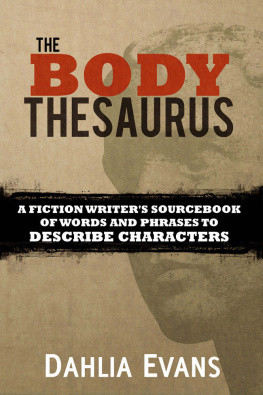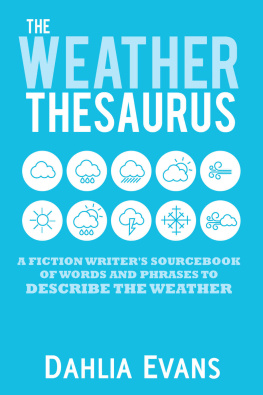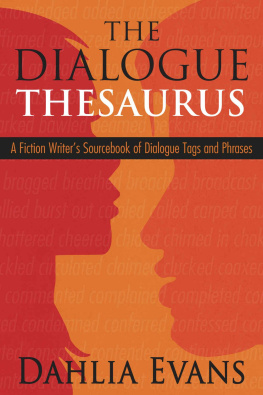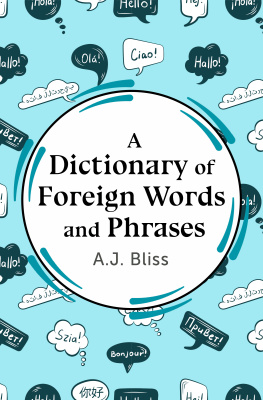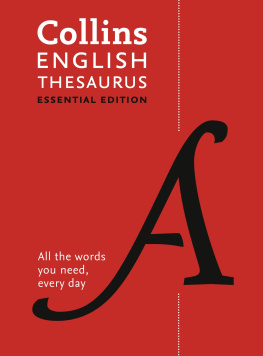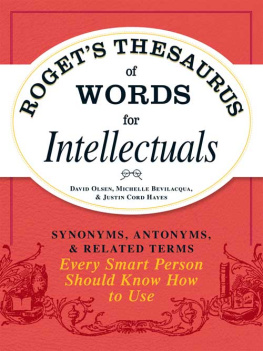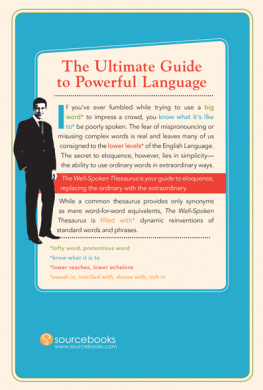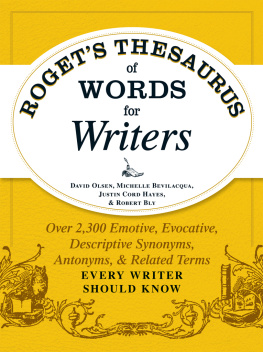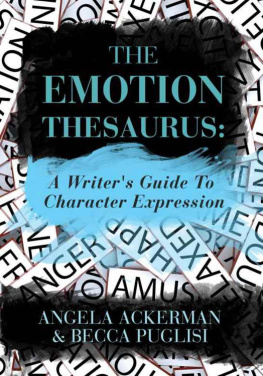Copyright Notice
Published By:
Satin Publishing
Copyright 2016 by Dahlia Evans. All Rights Reserved.
No part of this publication may be replicated, redistributed, or given away in any form without the prior written consent of the publisher.
Also by Dahlia Evans
The Dialogue Thesaurus - A Fiction Writer's Sourcebook of Dialogue Tags and Phrases
"The Book Every Aspiring Fiction Writer Needs On Their Bookshelf!"
Sometimes the word 'said' just doesn't cut it. Sometimes a writer needs something with a little more expressive power; a word or phrase that helps the reader visualize the tonal quality or mood of the character doing the talking.
For many years, writers have been eagerly awaiting the publication of a resource to help them with this dilemma. Thankfully, that wait is finally over. Now there's a way for any writer, regardless of their experience, to craft dialogue tags that add emotion and vibrancy to their storytelling; all while avoiding tired and worn out clichs.
Dahlia Evans has compiled a dialogue thesaurus unlike anything ever published. This unique sourcebook is filled to the brim with words and phrases gathered from hundreds of bestselling novels. Finally, you will be able to open up vistas of endless inspiration and bring your dialogue to life.
Inside You'll Discover:
# Over 500 dialogue and action tags you can use instead of 'said'.
# More than 2900 adverbs that can be used to describe speech.
# Thousands of emotion and feeling words in adjective and noun form.
# A thousand phrases to describe body language and movement.
# Tons of example sentences to help solidify your understanding.
# And best of all, words are sorted in alphabetical order, as well as by category.
The Dialogue Thesaurus is the first book of its kind; a thesaurus geared towards writers who want to frame their dialogue with compelling and expressive words and phrases.
Introduction
So, what's a body thesaurus, anyway? Simply put, it's a book that is arranged alphabetically by body part and includes all the adjectives, verbs, and noun phrases that have been used with said body part in published fiction. Meaning, these collocations (word groupings) come up again and again in all popular fiction.
Using textual analysis, I was able to extract this information from a huge body of texts and in turn save you countless hours racking your brain trying to think up a word to use. After all, every word you think of has probably already been used with that particular body part, and is thus part of this thesaurus. This way you'll save yourself time and a possible headache, not to mention get ideas you wouldn't have thought of.
How This Book Is Organized
The book is broken up into 40 chapters. Each chapter covers a single body part.
Each body part is further categorized by part of speech; adjectives, verbs and phrasal verbs, and noun phrases. The words and phrases in these categories are arranged in alphabetical order.
Example sentences are added at the end of each chapter to give you an idea of how to use an entry in a sentence. Entries are italicized for clarity.
Lastly, a note about entries. Verbs are listed in their past tense form. Also, American spelling is used, with a few British forms where that spelling is popular internationally.
How To Use This Book
1) Table of Contents
You know you want to describe your character but need ideas about what to describe. Check the Table of Contents for a list of body parts and let your imagination follow.
2) Adjectives
You know what part of the character you want to describe, now you just need a list of words to use. Go to the Adjective section and find one or more that fit your needs.
3) Verbs
You want to describe your character's movements. Go to the Verbs and Phrasal Verbs section and find a ton of verbs that can be used with that part of the body and end the use of cliche verbs once and for all.
4) Noun Phrases
You want to use a variation of the noun or describe an aspect of that noun (body part). Go to the Noun Phrases section and find many phrases to use instead.
This book was a big project. It took the better part of six months to finish. The thing that kept me going was knowing how valuable a resource this would be for writers of genre-based fiction - no matter what genre you write, I believe you'll find this book immensely helpful when writing character descriptions or describing actions.
As an aside, you may have purchased my other book 'Thinking Like a Romance Writer' and want to know how this book differs. Well, first and foremost, this book is for all fiction writers, and includes many words that are not needed or used in romance. That being said, that particular book was written a few years ago. Since then, I have expanded my romance database quite a bit. So romance writers can expect a 2nd Edition of 'Thinking Like a Romance Writer' in the near future.
In closing, I want to say thank you for your investment. I hope this thesaurus comes in handy with all your future writing projects.
Warm Wishes,
Dahlia Evans
1
ANKLE(S)
Adjectives in Alphabetical Order
aching; aging; attenuated; bad; bandaged; bare; beautiful; bird-slim; biting; black; blasted; blistered; bloody; blue; bluish; bone-cold; bony; booted; bound; bright-pink; broken; brown; bruised; busted; chubby; cold; cool; cracking; crossed; crushed; dainty; delicate; delicate-looking; dirty; dusty; elegant; enormous; excessive; exposed; fabulous; fair; fat; fine; fleshy; fractured; full; gimpy; good; gouty; grayish; hairy; hard; heavy; high; high-heeled; hurt; hyper-extended; injured; inner; knobby; knotted; knotty; laced; lacy; lame; left; little; lovely; low; lower; mottled; muddy; naked; narrow; nice; nimble; opposite; other; outer; painful; pale; pallid; pasty; plump; pretty; purple; purple-socked; red; resprained; retwisted; right; severed; shapely; shattered; short; silken; skinny; skirted; slender; slight; slim; small; sodden; soft; sore; spindly; sprained; stiff; still; still-slim; still-sore; stockinged; strong; swelling; swinging; swollen; tanned; tapered; tattooed; thick; thickish; thin; throbbing; tight; tingling; tiny; trim; turned; turning; twisted; twisting; ugly; unstable; varicose; warm; weak; weary; white.
Verbs and Phrasal Verbs in Alphabetical Order
ached; appeared; arrayed in; attached to; balanced; balanced on; banded together; bared; became; began; bent; bent at; bled; bloated; bobbled; bore; bothered; bound; bound by; bound in; bound to; bound up; broke; buckled; buckled beneath; caked in; caught; caught in; caused; clamped; clamped by; clutched; coated; coated in; covered; covered in; cracked; creaked; crossed; crossed against; crossed over; crushed; crushed in; cuffed; disappeared; disappeared into; dislocated; drenched; drenched in; elevated; encased in; exposed; fell; fell against; felt; fixed; flashed; flexed; folded; folded beneath; folded inward; freed; freed from; gave out; gripped; healed; held; held fast; held up; hooked; hooked around; hooked behind; hooked under; hung; hurt; itched; jarred; jerked; jostled; jutted out; knocked; knocked together; lashed together; locked; locked around; looked; loosened; peeked out; peeped from beneath; peeped out; perched on; played with; pointed through; poked out; poked through; popped; pressed; pressed against; prickled; prickled with; propped on; protested; protruded; protruded from; pulled; pulled up; quivered; rapped; remained; replaced; rested; rested on; rested sideways; returned; revealed; roasted; roasted by; rotated; rotated inward; sat in; sat on; scraped; scraped against; shackled; shaved; shocked; shook; shook with; shot through; showed; showed between; skated; slapped; slapped by; slid; slid up; slipped; snagged; snagged in; spattered with; sprained; spread apart; started to; stopped; strapped; strapped to; stretched; stuck out; stuck together; supported; supported by; swelled; swelled up; tattooed; tattooed with; throbbed; tied; tied to; tied together; tingled; touched; tucked in; turned; turned away; turned inward; turned on; twinged; twisted; twisted beneath; wobbled; wobbled over; worked; worked out; wrapped; wrapped in; wrenched.

